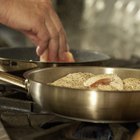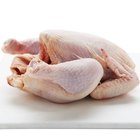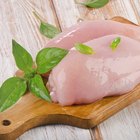More Articles
Proper handling of poultry products is essential, especially if you want to prevent yourself and those that you care about from becoming sick from possible foodborne illness. It doesn't matter if the chicken is raw or cooked – both only keep in optimal conditions for a certain amount of time before spoilage sets in and your food is no longer safe to eat. Learn more about what type of cooking conditions you can leave your chicken in before you need to toss it.
Temperature
Temperature plays a role in determining how well chicken keeps. Refrigerating chicken in temperatures of 40 F and below is best if you plan to eat the chicken within a couple days. Temperatures above 40 F (found in situations such as leaving your chicken out on your kitchen counter) can create a bacteria breeding ground. If left out too long on the counter or out on a picnic table, chicken is vulnerable to these bacteria and prone to spoilage.
Spoiling Time
Regardless if it is raw or cooked, you should consider throwing out your chicken two hours after you removed it from the fridge or a cooler with ice. Even if you are thawing chicken on the counter or storing it in a covered dish at a barbecue, the two-hour rule holds true. On extra balmy days, it is wise to pay attention to how long chicken stays out. If the air temperature is above 90 F, your chicken may spoil faster, so keep this in mind before you consider eating.
Refrigerate or Freeze
When you pick up chicken from the poultry section at your grocery store, it will last for one to two days raw in the refrigerator and three to four days when cooked. After this time, you should consider throwing it away. If you cannot cook or eat the chicken in this period, freeze it. A whole, raw chicken remains safe to eat for up to one year in the freezer, and raw chicken cutlets remain safe for nine months. If you want to freeze cooked leftovers, these can last in the freezer for two to six months.
When in Doubt, Don't
spoiled chicken – particularly cooked chicken – doesn't always have an odor or visual cues to let you know it's turned. If you don't know how long chicken or other poultry has sat at room temperature, play it safe and toss it. Although cooking chicken to 165 F kills bacteria, it doesn't affect the toxins they formed – you can't "cook away" spoilage.
Related Articles

If Chicken Doesn't Smell Bad, Can You ...

How Long Can Cooked Chicken Be ...

Can I Cook Chicken That's Been Thawed ...

If Chicken Smells Bad Can You Still ...

What Happens to Boneless Chicken if I ...

How Long Can I Keep Frozen Whole ...

Can I Cook a Whole Chicken Without ...

Is it Safe to Cook Chicken 2 Days After ...

Can You Boil the Bacteria Out of ...

How Long Is Cooked Chicken Good?
Can You Cook Frozen Chicken?

Can I Cook Chicken Two Weeks After the ...

How Long Can You Keep Cooked Chicken ...

Can I Start Marinating While My Chicken ...

How to Preserve Chicken

How to Cook Mojo Chicken

How Long Can Raw Meat Sit Out?

How to Bake Boneless Chicken to Stay ...

How Hot Are You Supposed to Cook ...

What Does It Mean When Hamburger Smells ...
References
Writer Bio
Jonae Fredericks started writing in 2007. She also has a background as a licensed cosmetologist and certified skin-care specialist. Jonae Fredericks is a certified paraeducator, presently working in the public education system.